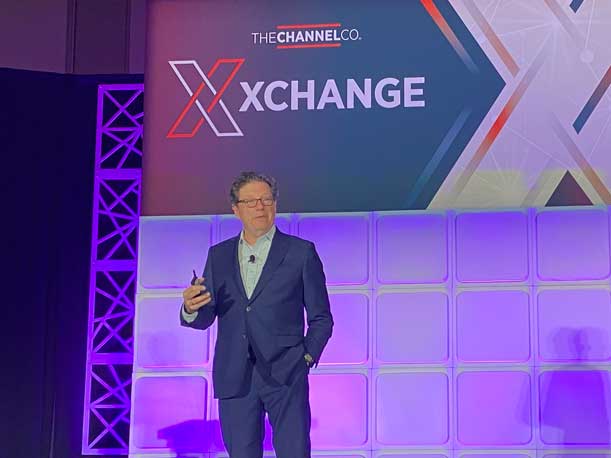MSPs Are ‘In A Better Position Than Any Industry’ If Recession Hits: Expert
‘The Fed has been tasked with doing the impossible, and that is the idea that they could bring down inflation and raise interest rates without tripping the economy into a deep recession,’ says Peter Ricchiuti, business professor at Tulane University. ‘They’re threading a needle and nobody’s saying it, but so far it’s going pretty well. If you’d like to see inflation drop quicker, that would come with a recession.’

The chance of a recession is negligible, but if it does happen it will be mild, according to Tulane University’s Peter Ricchiuti.
And MSPs are in “a better position than any industry I can ever think of going forward,” he said.
Ricchiuti, a Wall Street visionary and business professor at Tulane University spoke at CRN parent company The Channel Company’s XChange March 2023 event in Orlando this week about economic uncertainty that can bring opportunity.
And while he doesn’t believe a recession will hit, the biggest issue continuing to dominate the industry is labor shortages.
“And because of the big tech layoffs, you’re going to get a fair share of them, at least the ones that you want to get,” he said.
[RELATED: MSP Exec On Scale: ‘Run Your Business Like A Professional Sports Team’]
However, he noted that the supply chain is getting better as more and more manufacturing is being done in the U.S., Canada and Mexico.
The other aspect that’s going to lead to “sticky inflation” is higher inventory levels as things “just aren’t costs anymore.”
“It used to be that whatever you were building, it was entirely based on how quickly [and] how cheaply as possible they can build these things,” he said. “Now, it’s really a combination of cost and resilience.”
And inflation rates have gone down. The inflation rate in June was 9.1 percent. It has decreased every month since then to 6.4 percent.
“The Fed has been tasked with doing the impossible, and that is the idea that they could bring down inflation and raise interest rates without tripping the economy into a deep recession,” he said. “They’re threading a needle and nobody’s saying it, but so far it’s going pretty well. If you’d like to see inflation drop quicker, that would come with a recession.”
But in terms of the market and the U.S. economy, it’s very, very resilient, Ricchiuti said. And historically, recessions in the U.S. over the past 50 years have lasted 18 months at most, with many being under 12 months.
“All they were were short aberrations,” he said. “The market keeps going because capitalism works. Capitalism and democracy are the only systems that work, and we see it there.”
And the U.S. economy is user-driven, he said. “It’s always been and always will be, that’s what we do.”
In fact, middle class consumers are the job creators, “not the ultra rich.”
“Demand creates supply, supply doesn’t create demand,” he said. “So if you’ve got a healthy middle-class consumer, they’re buying a lot of things that then result in expansion.”
He said the reason the U.S. continues to soar, “even though it looks like we’re weird and fighting with each other,” is because Americans are creative.
“It’s a free nation,” he said. “And we’re getting more free time because efficiencies. It’s all based on creativity, and provided that doesn’t disappear, we’re always going to be on top.”
Dan Tomaszewski, president of Jenison, Michigan-based MSP Green Light Business Technology, said it’s hard not to consume the “doom and gloom” of what people are saying, but if everyone sticks to the facts, they’ll see that a recession doesn’t look to be happening.
“There’s this perception that this is going to happen, and people buy into the negativity,” he told CRN. “You’ve got to look at the reality of the facts and the reality is it’s not going to be as bad.”
As an MSP during the 2008 recession, Tomaszewski was in “growth mode” as many customers were in a position where they wanted to invest.
“Those that were in survival mode may not be investing in technology, but they wanted to make damn sure that what technology they had was going to keep working,” he said. “So we’re going to be far better off going through this than that. I’m very optimistic about it.”